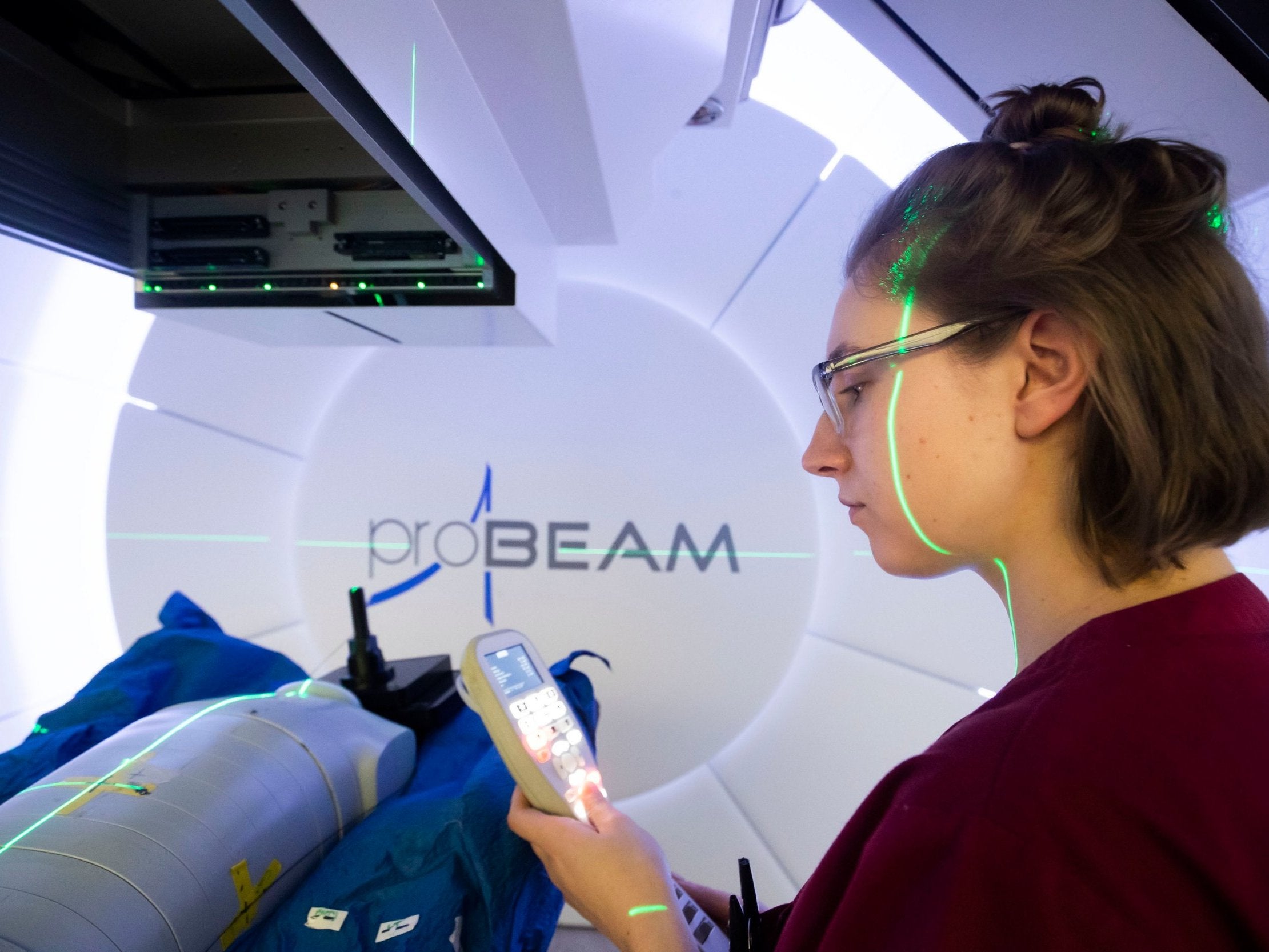Teenage boy with rare brain tumour to receive pioneering proton beam therapy at UK treatment centre
Highly targeted treatment helps shrink mass and cut risks of side-effects
Your support helps us to tell the story
From reproductive rights to climate change to Big Tech, The Independent is on the ground when the story is developing. Whether it's investigating the financials of Elon Musk's pro-Trump PAC or producing our latest documentary, 'The A Word', which shines a light on the American women fighting for reproductive rights, we know how important it is to parse out the facts from the messaging.
At such a critical moment in US history, we need reporters on the ground. Your donation allows us to keep sending journalists to speak to both sides of the story.
The Independent is trusted by Americans across the entire political spectrum. And unlike many other quality news outlets, we choose not to lock Americans out of our reporting and analysis with paywalls. We believe quality journalism should be available to everyone, paid for by those who can afford it.
Your support makes all the difference.A 15-year-old with a rare brain tumour is to undergo pioneering proton beam therapy at the UK's first dedicated treatment centre.
Mason Kettley, from Angmering in West Sussex, will receive the highly targeted therapy which helps shrink tumours and cuts the risk of side-effects.
It will be carried out by the Christie NHS Foundation Trust in Manchester – home to the world's newest proton beam therapy centre.
Mason is one of the first patients to undergo proton beam therapy in the UK and the first to go public.
Until now, British patients needing the treatment had to travel to countries including the US.
He was diagnosed with an inoperable tumour in October after suffering headaches and failing to put on weight.
Doctors found that the tumour was growing in a critical part of his brain but could not operate due to the risk of causing blindness and damage to vital brain tissue.
Mason, who wants to work as a doctor specialising in tumours when he is older, said he did not initially have many symptoms.
He said: "I had some headaches and stomach pains and usual things, and got check-ups at the doctors.
"My mum said, 'he's not gaining weight or growing', and eventually, when we moved last year, we saw doctors who told us to go to Worthing Hospital for an MRI scan.
"We had the scan and the result showed it was a tumour."
Following a biopsy and an operation to insert a shunt, doctors referred Mason's case to a national panel of experts.
They decided that his tumour – known as a benign pilomyxoid astrocytoma – made him a suitable candidate for proton beam therapy.

Mason, who lives with mother Cally, stepfather Ryan and four siblings – Taylor, 20, Logan, 10, Scarlett, seven, and Elijah, four – said he feels apprehensive about the treatment.
He said: "I'm a bit nervous because the machine is intimidating because of its size.
"It's a bit nerve-wracking but this is a better choice than chemo because it's more effective. Because of my age, (doctors) thought radiation would be a better choice.
"Their goal is to stabilise the tumour. It may shrink, but they are aiming to stabilise it."
Mason will have treatment Monday to Friday for almost six weeks - 28 sessions in total.
A specially made radiotherapy mask has been created to keep his head still during the therapy.
He said: "The short-term effects are that you may vomit and get a headache now and then, but in the long term the side effects are rare."
Mason's family has been hugely supportive, though his younger siblings are unaware of his treatment.
"My little sister and little brother don't know because they are young," he said.
"My 10-year-old brother understands a bit and he's a bit upset about it."
Mason, who will sit GCSEs next year, will have six weeks off school.
Proton beam therapy is a highly targeted treatment which hits tumours much more precisely than conventional radiotherapy.
This makes it beneficial for patients with difficult-to-treat tumours in critical areas, such as in the brain or spinal cord, and for young people whose tissues are still developing.
Two new proton beam therapy centres have been built at The Christie and University College London Hospital (UCLH) with £250m of government money.
Gillian Whitfield, consultant clinical oncologist who is leading Mason's care at The Christie, said: "With proton beam therapy, compared to conventional radiotherapy, there is less dose to surrounding normal tissues and less risk of permanent long-term effects of treatment.
"This is particularly important for children and teenagers with curable tumours, who will survive decades after treatment and are at much greater risk of serious long-term effects of treatment than adults.
"Mason's tumour is a low grade (slow growing) tumour with a high chance of cure.
"For Mason, in comparison to conventional radiotherapy, proton beam therapy should carry a lower risk of some important long-term side effects of treatment, particularly effects on short-term memory and learning ability and the risk over the next eight decades of the radiation causing other tumours."
Professor Stephen Powis, medical director for the NHS in England, said: "This is a hugely exciting development for the NHS and we are delighted that we are able to provide this life-changing treatment for patients like Mason."
Proton beam therapy hit the headlines in 2014 when the parents of Ashya King, who was due to undergo chemotherapy and radiotherapy at Southampton General Hospital, fled with him to Spain.
They were arrested in Spain but were eventually able to take him for proton treatment in Prague.
His father Brett has said Ashya is now cancer-free.
PA

Join our commenting forum
Join thought-provoking conversations, follow other Independent readers and see their replies
Comments